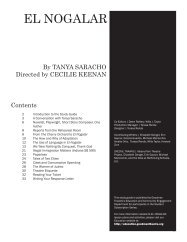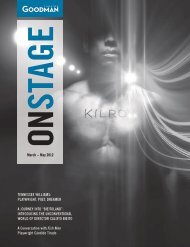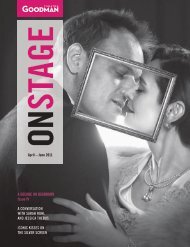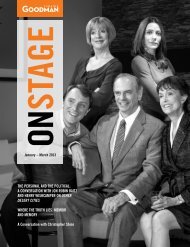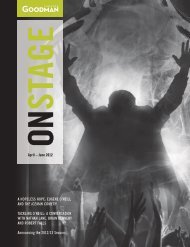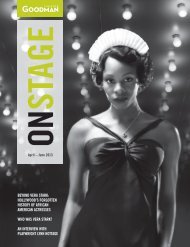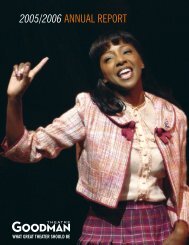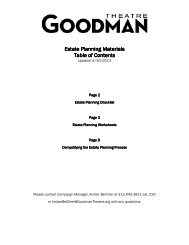Magnolia, atlanta and dr. Martin luther king jr. a ... - Goodman Theatre
Magnolia, atlanta and dr. Martin luther king jr. a ... - Goodman Theatre
Magnolia, atlanta and dr. Martin luther king jr. a ... - Goodman Theatre
You also want an ePaper? Increase the reach of your titles
YUMPU automatically turns print PDFs into web optimized ePapers that Google loves.
IN THE ALBERT<br />
From the Artistic Director<br />
Photo by Eric Y. Exit.<br />
Why <strong>Magnolia</strong>?<br />
Regina Taylor’s magnificent new play, <strong>Magnolia</strong>, offers a look at a time of seismic change in American society, in<br />
a city that was at the epicenter of that change. Atlanta in 1963 was in many ways typical of American cities of<br />
the time: a thriving cultural <strong>and</strong> social center for both black <strong>and</strong> white Americans, but one in which those societies<br />
existed steadfastly apart from each other in worlds that rarely intersected. When in January of 1963 the mayor of the<br />
city erected a physical barricade meant to maintain racial separation, the ramifications in both the black <strong>and</strong> white<br />
communities were immediate <strong>and</strong> unsettling, causing an inexorable change that epitomized the social revolutions that<br />
would consume the rest of the decade—<strong>and</strong> beyond.<br />
Although it is inspired in part by Chekhov’s The Cherry Orchard, <strong>Magnolia</strong> is the wholly American story of the families<br />
<strong>and</strong> individuals who were forced to finally deal with generational, societal <strong>and</strong> political issues that had been brewing<br />
for decades, through generations of genteel coexistence. As the world evolves, its inhabitants struggle to find their<br />
own voices in the face of evolution, with results that are both devastating <strong>and</strong> triumphant. In doing so, each character<br />
in the play must come to terms with the changes of the present as well as the issues of the past that have both<br />
divided <strong>and</strong> united them. As she has done so eloquently in such other works as Crowns <strong>and</strong> The Dreams of Sarah<br />
Breedlove, Regina imbues each of her characters with passion, grace <strong>and</strong> poetry, honoring their individual <strong>and</strong> collective<br />
struggles with dignity <strong>and</strong> compassion.<br />
It is a great pleasure for me to welcome Regina back to the <strong>Goodman</strong> where she has created some of our most distinguished<br />
works, <strong>and</strong> to pair her with Anna Shapiro, one of our country’s finest directors. In the aftermath of one<br />
of the most historic elections in America’s history, it is especially fitting that these artists <strong>and</strong> their gifted collaborators<br />
can take us back to another time of unprecedented change <strong>and</strong> possibility, through the finely wrought language <strong>and</strong><br />
indelible images of <strong>Magnolia</strong>.<br />
Robert Falls<br />
Artistic Director<br />
1



